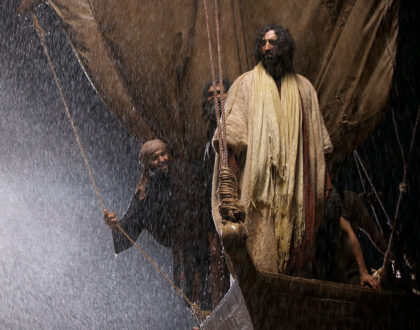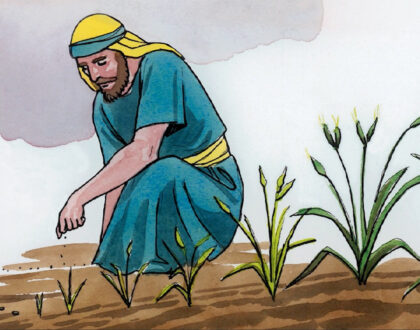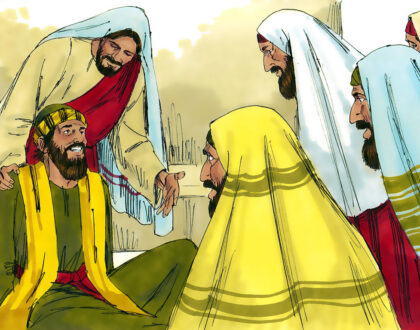The Love of the Father
“The Love of the Father”
Archbishop Loren Thomas Hines
Fourth Sunday of Lent
March 6, 2016
Readings: Joshua 5:9-12, Psalm 34:1-8
2 Corinthians 5:17-21
Luke 15:11-32
We’re on a journey thru history to make us understand that from the very start, God’s heart has been for us and everything He does is to show us how much He loves us. When Adam failed, man took that to mean that it was the end of his relationship with God, and since then, we have been waiting for the return of Christ so He can restore that relationship.
Our readings today show us clearly how committed God is to His people. In Psalm 34:8, we are exhorted to “taste and see that the Lord is good”. Do we realize the goodness of the Lord and do we allow this goodness to be the motivation of our lives? The Lord is good! He doesn’t punish. He may discipline us but that is only because He loves us and doesn’t want us to go the wrong way.
In the Old Testament, we read that Israel had failed God and ended up in Egypt. From Joseph’s captivity to his being given control over all the land of Egypt by Pharaoh, God made a way for His people to be fed and provided for during the seven-year famine. When the Egyptian army was pursuing Israel as they departed Egypt, God used the Red Sea to destroy all the enemies, the very same sea that He used to give Israel safe passage. Yet in spite of everything that God had done for them, in spite of the hardships they endured in Egypt and the fact that after its defeat in the Red Sea, Egypt had lost its might, Israel still wanted to go back. They remembered the leeks and the onions, even if the manna sent but God sustained them. “The sons of Israel walked forty years in the wilderness, until all the nation, that is, the men of war who came out of Egypt, perished because they did not listen to the voice of the Lord….” (Joshua 5:6). When the elders died, Joshua took over and Israel made a commitment to God. He instructed Joshua to have the men circumcised, and their circumcision was the sign of God’s covenant with His people. The Lord said to Joshua, “Today I have rolled away the reproach of Egypt from you” (verse 9). God took away the curse of Egypt from Israel and led them to the Promised Land, a city prepared years ago, with its fields planted and its produce ready for harvest. When Israel ate their first meal in Canaan out of the produce of the land, God stopped giving them manna. The curse had been lifted. We should note that when God established His covenant with His people, He removed the old curse, ceased giving them manna and gave them good food – the best of the land. This covenant is also for us! We have access to the “best of the land”. As we read in 1 Corinthians 10:6 last week, these things happened as examples for us.
The Gospel reading, traditionally referred to as The Prodigal Son, is really the story of the father and his love for his sons. This father worked hard to acquire his wealth and attain respect in the community. The younger son was curious about the world outside of his home and wanted adventure. Just like Adam and Eve, he wanted more than all the comforts of home he was already enjoying. He wanted to get his inheritance and so asked his father to give him his share of the estate. His father divided his wealth between his two sons, after which the younger one left for a distant country where he squandered his estate with loose living. He left “Canaan”, the land of God’s blessings to go to a land where he lost everything. At that time, a severe famine took place and “he became impoverished”. He attached himself to a man in that country – a Gentile separated from God – who sent him into his fields to feed swine. He had no place to sleep so he slept with the pigs. He had no food that he would have gladly fed on the pods that the swine were eating. This is the lowest that one can get. When he came to his senses, he remembered that his father’s servants ate better, and so he decided to go back to his father and ask his forgiveness.
Meanwhile, his father watched everyday for his son. He never gave up on him. When he saw his son coming while still a long way off, he ran to meet him. In those days, an elderly man didn’t run because it was considered undignified. But he was filled with compassion for his son that he ran to him. The son said to him, “Father, I have sinned against heaven and in your sight; I’m no longer worthy to be called your son” (Luke 15:21). This was effectively a confession, an admission of wrongdoing. His father ignored what he said and embraced him even if he must have smelled foul because he stayed with pigs. Not only did his father embrace him, he also kissed him. The father then bade the servant to “bring out the best robe and put it on him and put a ring on his hand and sandals on his feet” (verse 22). The robe represented the father’s position in the village. He covered the foul smell of his son! This is like Christ removing our sins and covering us with the robe of righteousness. The father also instructed the servant to kill the fattened calf so they could have a feast in honor of his son, “for this son of mine was dead and has come to life again; he was lost and has been found” (verse 24). Through this parable, God wants us to understand that He has forgiven us and restored us back to right standing with Him in Christ.
Meanwhile, the older son came home from the field and when he was told that his father has killed the fattened calf because his brother has returned safe and sound, he became angry and refused to go inside. When his father came out to plead with him, he spoke of his bitterness – something that he probably shouldn’t have done. “For many years I have been serving you and I have never neglected a command of yours; and yet you have never given me a young goat so that I might celebrate with my friends” (verse 29). The older son accepted the covering of his father but he didn’t respond to the blessings of his father; probably like the Jews who would partake of the blessings of God then go back to sinning. The older son had his father’s wealth but he wasn’t enjoying it. Are we like him?
2 Corinthians 5:17 “If anyone is in Christ, he is a new creature; the old things have passed away; behold new things have come.” We are to leave our old ways behind. We are new creation. Psalm 103: “Forget none of His benefits”. Once we were darkness, now light; in poverty and now blessed; sick and now healed. Do we live out what God gave us or are we like the older son? Lent reminds us of what Christ did for us – He suffered and died for us. He gave us everything pertaining to life and godliness. Why are we still murmuring and complaining? We have forgotten our benefits! God put His ring on our finger, a declaration that now we belong to Him. At creation, He breathed His breath into man. The breath of God is in us.
Ephesians tells us what God has given us. He gave us all a measure of faith, holiness and life. We have the right to deny it or ignore it, but this life is always available for us to enjoy. May we awaken to what God has done for us and begin to live out the hope we have. Lent reminds us that Christ separated Himself from the Father, took on flesh, and took upon Himself our sins so we can have His righteousness. He will never leave us nor forsake us.
The younger son took the provisions from his father, but he squandered them away, and all on himself. He took the splendor of his father’s work and ended up sleeping with pigs. Christ gave us of God’s splendor. Will we use this wisely or end up sleeping with pigs?
Recent Sermons

Jesus, Calmer Of Storms
June 23, 2024

Harvest Time Stemming From The Smallest Seed
June 17, 2024

Not Bound By Limitations To Minister
June 10, 2024

